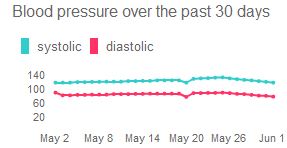Quantifying Myself: Under Pressure
In addition to recording activity and calories, the Fitbit provides an online dashboard to manually record weight, blood pressure, glucose levels, and other factors. Because I would frequently look at my dashboard throughout the day, I found myself recording my blood pressure much more regularly. (Thanks to a family history of hypertension, I have a blood pressure monitor at both home and work. But I typically forget to use it for months. And when I have a doctor’s appointment, I invariably forget to bring the written record.)

On the negative side, the Fitbit’s graph of blood pressure data is fairly low-resolution and would be difficult to share with my doctor. And I couldn’t find a way to get the raw data or create a more meaningful printout. So for blood pressure tracking, I ultimately switched over to MedHelp, an online tool that lets you track a multitude of health trends, such as mood, pain, and ovulation, in a higher-resolution graph. Medhelp can be set to send e-mail reminders to update your chosen tracker daily, weekly, or monthly. (A downside to MedHelp’s blood pressure tracker: it doesn’t allow you to record multiple readings for a single day.)

By more closely monitoring my blood pressure, I discovered the significant effect that medications can have. Taking ibuprofen for back pain consistently boosts it by 10 or more points. The increases were linked specifically to the medication, rather than to the level of pain. Ibuprofen and other NSAIDS (nonsteroidal anti-inflammatory drugs) have previously been linked to hypertension, but I didn’t know that. I hope I will be able to track these kinds of changes more closely with Withings’s new Wi-Fi enabled blood pressure monitor, which recently went on the market in Europe.
Previous Post: How Four-Legged Friends Disrupt Sleep
Tomorrow: Self-tracking Failures
Keep Reading
Most Popular
Large language models can do jaw-dropping things. But nobody knows exactly why.
And that's a problem. Figuring it out is one of the biggest scientific puzzles of our time and a crucial step towards controlling more powerful future models.
The problem with plug-in hybrids? Their drivers.
Plug-in hybrids are often sold as a transition to EVs, but new data from Europe shows we’re still underestimating the emissions they produce.
Google DeepMind’s new generative model makes Super Mario–like games from scratch
Genie learns how to control games by watching hours and hours of video. It could help train next-gen robots too.
How scientists traced a mysterious covid case back to six toilets
When wastewater surveillance turns into a hunt for a single infected individual, the ethics get tricky.
Stay connected
Get the latest updates from
MIT Technology Review
Discover special offers, top stories, upcoming events, and more.